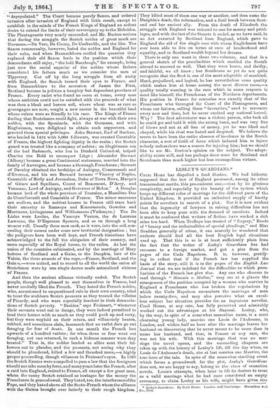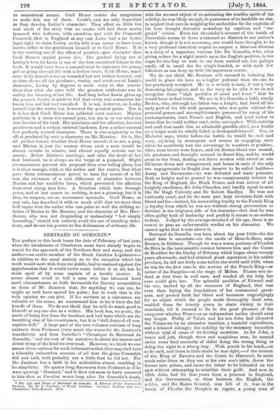LESLEY'S GUARDIANS.* Caen HOME has dispelled a fond illusion. We
had hitherto supposed that the law of England possessed, among its other transcendent merits, this pre-eminent one,—that by its glorious complexity, and especially by the beauty of the system which keeps up different rules of marriage for the different parts of the United Kingdom, it provided au unlimited supply of knotty points for novelists in search of a plot. But it is now evident that the ingenuity of lawyers in raising difficulties has not been able to keep pace with the demand of novelists. Indeed it must be confessed that writers of fiction have worked a rich mine too hard. When Trollope has treated of "forgery," Betide of "lunacy and the technicalities of special pleadings," and Miss Braddon generally of crime, it can scarcely be wondered that authors should find all the best English legal situations used up. That this is so is at least sufficiently plain from the fact that the writer of Lesley's Guardians has had recourse to a foreign market, and got a plot from the pages of the Code Napoleon. It is, however, gratify- ing to reflect that if the French law has supplied the basis of the story, still it is to the pages of the English Laic Journal that we are indebted for the difficulties to which pecu- liarities of the French law give rise. Any one who chooses to read through " Simonin v. Malice," may see at a glance the strangeness of the position occupied by a woman who marries in England a Frenchman who has broken the- regulations by which the Code Napoleon encumbers the marriage of men below twenty-five, and may also perceive what an excel- lent subject her situation provides for, an ingenious novelist. Cecil Home, at any rate, has fully perceived and admirably worked out the advantages at his disposal. Lesley, who, by the way, in spite of a somewhat masculine name, is a most charming young lady, marries one Louis de l'Aubonne, in London, and within half an hour after the marriage leaves her husband on discovering that he never meant to be more than in name her husband, and that, in France at any rate, she was not his wife. With this marriage that was no mar- riage the novel opens, and the succeeding chapters are taken up with the history of Lesley's life, till the day when, on Louis de l'Aubonne's death, she at last marries one Maurice, the true hero of the tale. In spite of the somewhat startling event which forms a groundwork for the plot, Lesley's Guardians does not, we are happy to say, belong to the class of sensation novels. Louis's attempts, when later in life he desires to treat as a valid marriage what he had once considered an empty ceremony, to claim Lesley as his wife, might have given rise
Lesley's Guardians. By Cecil Home. Loudon aud Cambridge: Idsomllien glad Co., 1854.
to sensational scenes. Cecil Home resists the temptation to make this use of them. Louis's acts are only important as they develop Lesley's character. They affect SO little the real merit of the story that no reader will feel those merits lessened who believes, with ourselves and with Sir Cresswell Cresswell, that in England at any rate Louis had a far better legal right to claim Lesley as his wile than seems to have been known either to the gentleman himself or to Cecil Home. It is in the working out of the effect of position upon character that Cecil Home's special power lies. The gradual dying out of Lesley's love for Louis is one of the best conceived things in the book. It would have been a natural error to represent the young girl as going through life with a broken heart. Cecil Home, much more truly describes her as wounded but not broken-hearted, and as time shows all the petulance, vanity, and weakness of Louis's character, Lesley by degrees is made wake to the convic- tions that what she once held the greatest misfortune was in reality the blessing of her life. And long before Louis gives up the pursuit, Lesley is made to feel that every real connection be- tween him and her had vanished. It is not, however, on_Lcsley herself that the writer has bestowed the greatest pains. Nor is it in her that Cecil Home has achieved most success. Marion performs in a sense the second part, but she is to our mind the true heroine of the book. Her petulance and her affection, her real gentleness and a certain external hardness, form a rather unusual but perfectly natural character. There is also originality in the effect produced by such a character on Mr. Maurice. He is, like all perfect heroes, whether Cecil Home intends it or not, a prig, and Marion is just the woman whom such a man would be almost certain to admire, and almost equally certain not to marry. Before Marion's marriage, and after the death of her first husband, he is always on the verge of a proposal. Slight circumstances prevent the proposal from ever taking place, but it is clear enough, both to the author and the reader, that what gave these circumstances power to turn the course of a life was the existence of a real difference of character between Marion and her would-be lover, which prevented his affection from ever rising into love. A flirtation which lasts through years, and at last comes to nothing, is not a pleasing, but it is also, we suspect, not an uncommon spectacle. Cecil Home, at any rate, has described it with so much skill that we more than half regret that the writer. who can paint so well the shifting re- lation of Marion to Mr. Maurice, and the character of Mrs. Haw- thorne, who was not despending or melancholy "but simply lamenting," should not entirely avoid the use of startling situa- tions, and devote his powers to the delineation of ordinary life.































 Previous page
Previous page